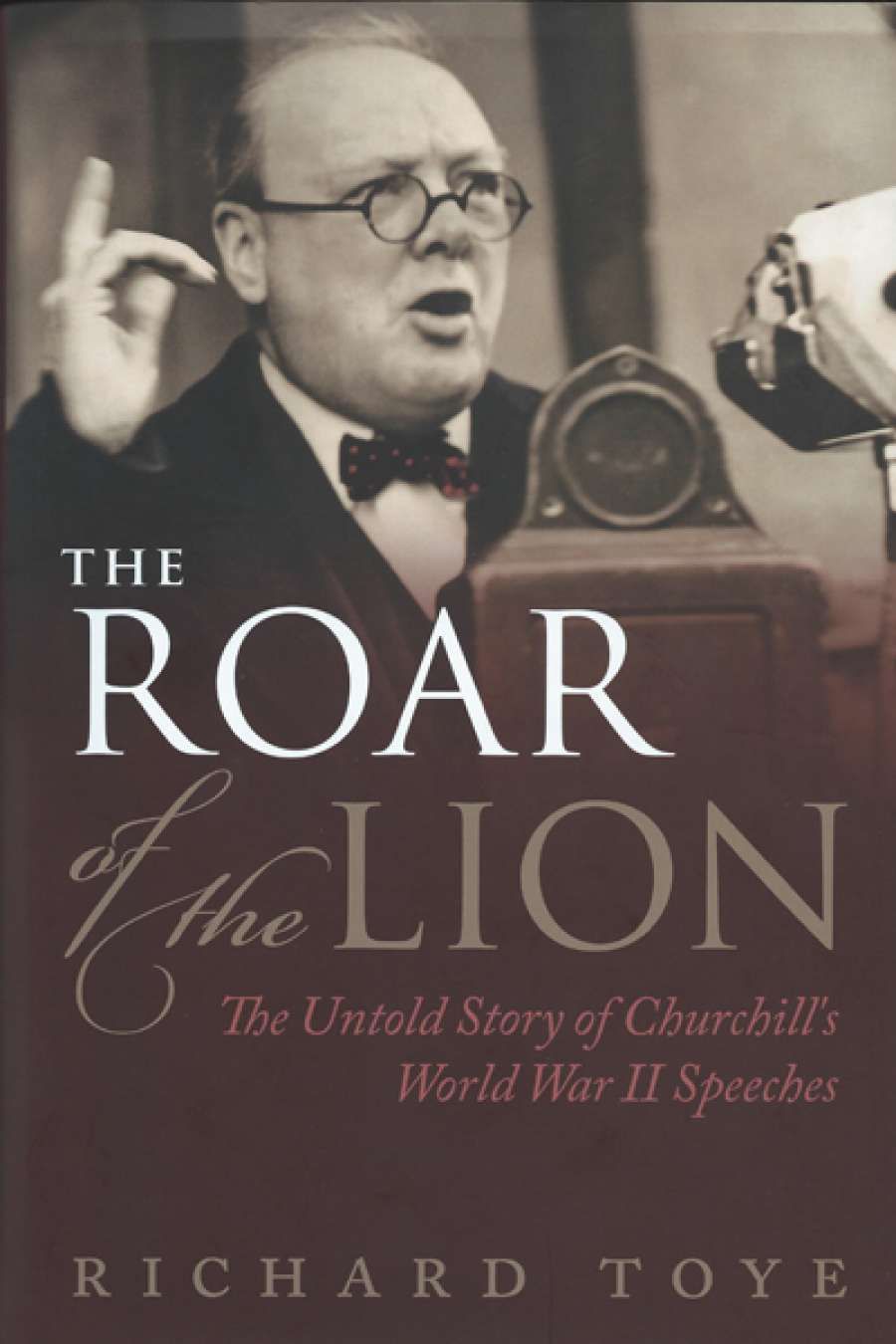
- Free Article: No
- Contents Category: Politics
- Custom Article Title: Robin Priors 'The Roar of the Lion'
- Review Article: Yes
- Article Title: The roar of the lion
- Online Only: No
- Custom Highlight Text:
In his introduction to this book, Richard Toye makes the startling but, as far as I know, accurate claim that this is the first book to offer a comprehensive analysis of Churchill’s wartime speeches. For a series of orations that now occupy many pages of any dictionary of quotations, The Roar of the Lion fills a surprising gap. Unfortunately, it does not fill it adequately.
- Book 1 Title: The Roar of the Lion
- Book 1 Subtitle: The Untold Story of Churchill’s World War II Speeches
- Book 1 Biblio: Oxford University Press, $47.95 hb, 320 pp, 9780199642526
Professor Toye makes a number of claims. The first is that both Churchill and his speeches were less popular with the public than was once thought. The second is that Churchill’s speeches did not have the morale-boosting effect of popular belief. The third is that there is no evidence that Churchill’s speeches were the decisive factor in influencing Britain’s willingness to fight on in 1940.
Let me begin with the third assertion. It is surely a straw man. Who, among serious historians of this period, has ever suggested that Churchill’s speeches were decisive in dictating British actions in 1940? It is necessary to state the obvious. Britain fought on in 1940 because of the strength of the RAF and of the navy. This was well known to the military authorities in Britain and formed the basis of Churchill’s decision to continue the struggle. Morale in war is hardly conditioned by speeches alone. It is the military situation that matters most, and in 1940 the people of Britain knew that their navy was infinitely stronger than its German equivalent and it became increasingly obvious to them that the RAF was at least holding the Germans in aerial combat. Churchill’s speeches were but one factor in sustaining British morale.
The other two claims need to be taken more seriously. Did Churchill’s speeches always boost morale? The answer seems to me to be in line with Richard Toye, but for a different reason. They did not always boost morale, because in many cases that was not their purpose. For example, when Churchill, in his first speech in the House of Commons, spoke of victory at all costs and in spite of all terror, he was hardly trying to raise morale. He was instead doing two other things. He was warning the people that the road ahead would be long andhard. But above all he was laying down his policy to those dissidents in the Conservative Party who were not fully supporting him. He was saying to the followers of Neville Chamberlain and Lord Halifax that his policy brooked no negotiation with the dictators. His policy was victory at all costs. This was a challenge to these men to declare their policy: victory at some cost? negotiation at all costs? In other words, Churchill was trying to make it difficult for them to have any other policy but his. This was not morale-raising stuff, because it was not meant to be, a point Toye seems to have missed entirely.
 Winston Churchill gives his famous 'V' sign in Downing Street.
Winston Churchill gives his famous 'V' sign in Downing Street.
What of Toye’s view that Churchill and his speeches were not as popular with the public as legend suggests? The first thing to be said is that Churchill was of course a politician and it would be the wonder of the age if a politician met with universal approval. Nevertheless it is difficult to see how Toye can reach his conclusion when the Gallup poll he refers to shows Churchill with an eighty per cent approval rating. He offers not one shred of evidence to support his claim that this was overstated. Neither does he acknowledge the 1941 Mass Observation Report that showed an even higher level of popular support for Churchill. There is indeed considerable evidence that most people did approve of Churchill.
In a short review I can only take one example, but the pattern persists throughout the book. Consider the ‘fight them on the beaches’ speech. Despite Toye’s claim that many of Churchill’s speeches were not well received in the United States, this was obviously not one of them, for such disparate sources as Ed Murrow and the Chicago Daily Tribune thought it a great speech. In Britain, The Times reported that people were stopping each other in the streets to talk about it. Of the diarists Toye quotes, most liked it. The Home Intelligence Report commented that it was well received in Birmingham. Where is the negativity? Toye notes that the speech was thought by some to raise doubts about the intentions of France. This was no doubt because it was intended to. Churchill had the greatest doubts about the French and was perhaps warning Britons that they would have to fight alone. One diarist does remark that the speech was a good one but it failed to cheer people up. But it needs to be said again, Churchill was not some music-hall act to be trotted out to give people a good laugh. He was attempting in his speeches to tell the British the actual position they were in on the grounds that they might appreciate the truth.
To conclude, this book has problems of selectivity. The evidence that Richard Toye selects to prove that Churchill’s speeches were not so popular actually proves the opposite. The evidence that he does not include supports the view that Churchill was very popular indeed. It will need a better effort than this to dent the reputation of Churchill and his speeches.


Comments powered by CComment